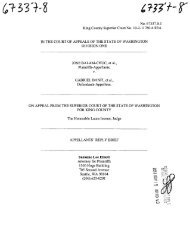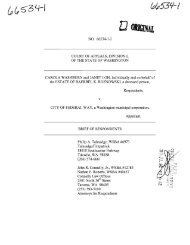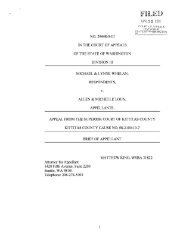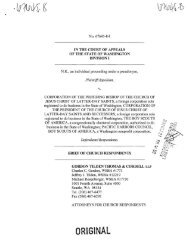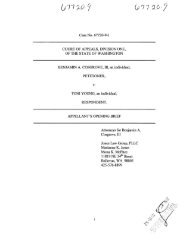Appellants' Reply Brief - Washington State Courts
Appellants' Reply Brief - Washington State Courts
Appellants' Reply Brief - Washington State Courts
You also want an ePaper? Increase the reach of your titles
YUMPU automatically turns print PDFs into web optimized ePapers that Google loves.
economic success. See Exs. 19, 20; Hallett 75-77, 92. These too<br />
represent business expenditures that should be deducted from Malang's<br />
gross receipts to most accurately capture her lost earning capacity. These<br />
same principles apply to the other business expenses that Malang declared<br />
on her Schedule C. These expenses contributed to Malang's ability to<br />
generate the gross receipts disbursed to her.<br />
Malang also asserts that "[tlax return preparation is not an expense<br />
ofproducing income; it is a consequence of income." RB at 35. And she<br />
asserts that gifts for clients and contributions to the community relate to<br />
business that she "already had, so this cost was not an expenses [sic] of<br />
producing earnings." RB at 36. In both respects, however, she missed<br />
dates the purpose of the expenditures, which was to ensure that her<br />
business enterprise continue to generate income in the future. She made<br />
these expenditures because she wanted to generate even more new<br />
business from her past and present clientele.<br />
Finally, Malang appears to be confused when she quotes from<br />
Board discussion in In ve Daniel A. Renshaw, BIIA Dckt. Nos. 02 16572,<br />
02 16573,2003 WL 22479584 (Aug. 27, 2003), regarding a deduction the<br />
employer made, per a collective bargaining agreement, from a union<br />
worker's cash wage to an account. RE3 at 35. The Board held that under<br />
the circumstances of that case the deduction resembled direct deposit of



